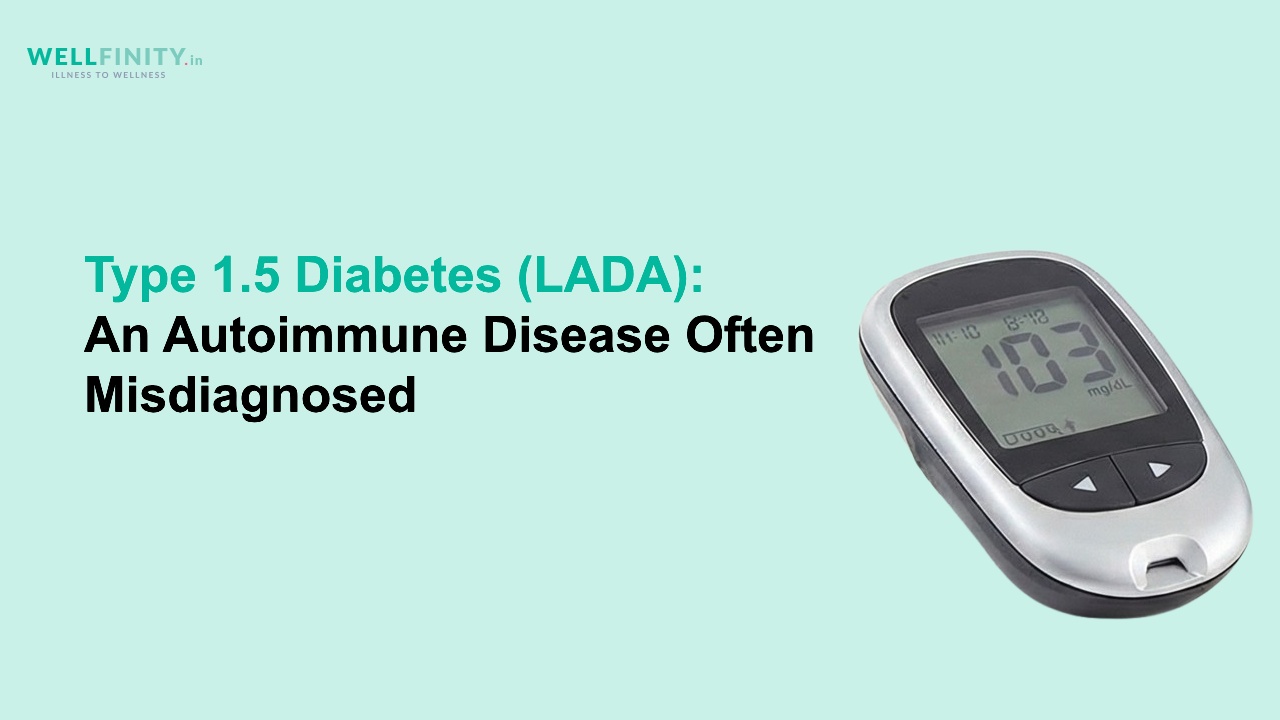Wellfinity health center
Or choose a category to quickly find the help you need

“They studied my case thoroughly and recommended a change in diet (e.g. no wheat, no dairy products, no milk and addition of millets etc.). They further suggested natural probiotics, cold pressed coconut oil, homemade detox drink after which I started feeling much better and that too without any medicines” – As reported by the member herself
- Author : Team Wellfinity
- Updated:
I was suffering from Diabetes for the past 1.5 years for which I taking both insulin and medicines. My doctor referred me to Dr. Thangadurai for a consultation. Prior to 2 months, my sugar levels were like 420 mg% and now it is totally under control without any medications. I am no longer feeling dull and lethargy but have a renewed energy and a healthy self!
- Venkatachalam, 42 yrs
Featured articles

Most people are familiar with Type 1 and Type 2 diabetes. But over the last decade in clinical practice, I’ve watched a third category silently rise. The one that behaves like a hybrid of both conditions. It’s called Type 1.5 Diabetes, medically known as LADA (Latent Autoimmune Diabetes in Adults).
Unlike traditional Type 2, which develops from insulin resistance, LADA is rooted in autoimmunity. Yet because it begins in adulthood and progresses slowly, most people get diagnosed and get treated as Type 2 for years.
And that single misdiagnosis shapes a long, exhausting journey for patients.
This article aims to give people clarity on what LADA is, why it’s missed, what patients typically go through emotionally and physically, and how a Functional Medicine approach helps bring back stability, confidence, and long-term metabolic balance.
1. What Most LADA Patients Go Through Before Getting the Right Diagnosis
The earliest and most heartbreaking pattern I see in LADA patients is confusion. They are often hardworking, disciplined individuals who genuinely try to manage their health. They follow the diet plans, take their medications on time, walk regularly, and do everything they are told and yet their blood sugar keeps rising.
They tell me things like:
“Doctor, I feel like I’m losing control no matter what I do.”
“My sugar behaves unlike anything I’ve seen in my family.”
“I did everything correctly… So why are my numbers still climbing?”
The truth is simple:
“LADA behaves differently because the root cause is different.”
While they are trying to manage insulin resistance, their body is quietly losing insulin production due to an autoimmune attack. For years, many LADA patients are told it’s “poor discipline,” “bad genetics,” or “just progression.” But none of these explanations match their lived reality.
Some even begin to distrust their body, believing they’re doing something wrong. That emotional burden; the feeling of being unheard or mislabeled is one of the most damaging aspects of a delayed LADA diagnosis.
2. Why LADA Gets Misdiagnosed as Type 2 So Frequently
Most adults with high blood sugar are automatically placed in the Type 2 category. Conventional assessments rarely check for autoimmune markers, so the deeper root goes unnoticed.

Because LADA starts slowly and insulin production declines gradually, the early numbers resemble typical Type 2 diabetes. But the resemblance is misleading.
Unlike Type 2, which improves significantly with weight loss, medications, and lifestyle modification, LADA keeps progressing regardless of these changes because the pancreas is under immune attack.
Many patients are only diagnosed with LADA after years of fluctuating numbers, rapid treatment escalation, or sudden insulin dependency.
3. The Emotional and Physical Toll of Misdiagnosis
The problem is not just medical — it’s deeply personal.
LADA patients often feel:
- Frustrated when medications stop working as expected
- Exhausted by constant fluctuations in energy and sugar readings
- Anxious when numbers worsen despite consistent efforts
- Misunderstood because their condition behaves differently from typical Type 2
Family members may unintentionally judge them. Doctors may assume non-compliance. And patients often feel ashamed, even though the real cause is immune-based and not behavior-based.

This emotional toll is enormous. Many patients tell me that years before they reached my clinic, they had lost confidence in their own body.
A correct diagnosis finally gives them relief, not because they want another label, but because everything they experienced now makes sense.
4. The Conventional Treatment Path — and Where It Falls Short
Most LADA patients begin with the standard Type 2 protocol. Initially, medications like metformin seem to help because the pancreas still produces some insulin.
But over time, as autoimmune destruction continues, medication after medication loses its effect. Eventually, insulin becomes necessary much earlier than in typical Type 2 cases.
The conventional model focuses primarily on numbers such as fasting glucose, post-meal spikes, A1C and adjusts medication accordingly. But it rarely looks at why those numbers behave the way they do.
Because root causes remain unaddressed, the progression feels rapid, unpredictable, and difficult to control.
Traditional Treatment vs. Functional Medicine Approach
| Aspect | Traditional Treatment | Functional Medicine |
| Primary Focus | Manage blood sugar through medications | Identify and address root autoimmune triggers |
| Diagnostic Tests | Basic glucose tests | Autoantibodies, C-peptide, gut health, inflammation markers |
| View of LADA | Often misdiagnosed as Type 2 | Recognized as autoimmune diabetes |
| Early Treatment | Oral medications | Immune modulation + metabolic support |
| Goal | Control glucose numbers | Preserve β-cell function + stabilize immune system |
| Lifestyle Guidance | Generic diabetes diet | Personalized gut, inflammation, metabolic, and hormone support |
| Patient Experience | Frequent medication escalation | Predictable, root-cause-driven progress |
5. The Short-Term “Improvement Illusion” in LADA
Many LADA patients initially respond to basic diabetic medications (particularly with insulin secretagogues like sulfonyl ureas) or dietary changes because some insulin production still exists. But as the autoimmune attack progresses, that response fades. Suddenly, what worked last year or last month no longer works.
This shift confuses patients deeply. They get stricter with food, reduce carbs further, walk more, and push harder only to see no meaningful improvement. That’s because the root issue is not insulin resistance alone but declining insulin production.
Recognizing this pattern early is essential to prevent years of unnecessary frustration.
6. How Functional Medicine Approaches LADA Differently
Functional Medicine doesn’t stop at the diagnosis. Instead, it asks deeper questions:
- Why did the autoimmune response begin?
Most of the autoimmune conditions follow a typical pattern – a chronic emotional stress for a few years followed by leaky gut (sympathetic overdrive along with inflammation); Leaky gut is a prerequisite of autoimmunity. BCM-7 (A1dairy), Gluten are some of the triggering factors involved in the pathogenesis of autoimmune diabetes.
- Are there gut issues contributing to immune imbalance?
Leaky gut and the gut inflammation (endotoxemia) can bring about chronic low-grade inflammation. In addition to that, improperly digested proteins (peptides) enter into the circulation which may produce molecular mimicry with the beta cells of pancreas.
This may lead to false recognition of the beta cells of pancreas as the antigen (foreign body) and hence eventually your own immune system attacks its own tissues leading to the destruction of beta cells of pancreas.
- Is chronic inflammation accelerating β-cell loss?
Chronic inflammation harms beta cells by cytokine damage (proinflammatory cytokines), de-differentiation (beta cells losing their specialized identity and function), increased apoptosis (oxidative stress and ER stress), immune cell infiltration (macrophages to the pancreatic islets).
- Are stress pathways overactive?
Oxidative stress (an imbalance between free radicals and antioxidants) with elevated markers such as 8-iso-PGF2 alpha worsens with poor glycemic control.
HPA axis (Hypothalamic-Pituitary-Adrenal axis) and Autonomic Nervous system: Chronic psychological and physiological stress activates the HPA axis, leading to the release of hormones like cortisol and adrenaline. Emotional fluctuations and serious life events have been implicated as potential factors in the induction of LADA in susceptible individuals.
- Are nutrient deficiencies impairing metabolic or immune function?
As we all know that vitamin D is a natural immunomodulator, vit D deficiency across all the population is associated with several fold increase in the incidence of autoimmune conditions. General malnutrition or deficiencies hinder overall immune function, making the body less effective at regulating the inflammatory responses that drive autoimmunity.
- Are toxins or viral triggers playing a role?
Viral infection may act as trigger by various mechanisms which includes
- Molecular mimicry – a viral protein’s structure similar to a self-protein that the immune system’s response to the virus cross-reacts with the body’s own tissues.
- Bystander activation – overactive immune system damaging healthy cells that can release self-antigens triggering a self-attacking response.
- Epitope spreading – persistent viral infection causing ongoing tissue damage)
- Immune cell manipulation – some viruses can directly affect immune cells, like immortalizing B cells leading to the production of autoantibodies.
- v. Interference with central tolerance – viral infections during the development of T cells in the thymus can interrupt the normal process of eliminating self-reactive T cells.
By exploring these answers, we can create a targeted, personalized plan that focuses on slowing progression, reducing inflammation, and improving metabolic stability.
Functional Medicine doesn’t replace medical therapy — it enhances it by treating the terrain in which the autoimmune process develops.
7. The Root Causes Functional Medicine Looks At
Most LADA patients have underlying imbalances that contribute to autoimmune activation.
These include gut dysbiosis, chronic inflammation, viral triggers, nutrient deficiencies, prolonged stress, and toxin overload. Each of these factors can independently influence immune behavior, and when combined, they amplify autoimmune activity.
A significant portion of the immune system resides in the gut. When gut health is compromised, the immune system tends to become reactive and misdirected. This is why gastrointestinal healing is often foundational in Functional Medicine protocols. Similarly, chronic stress elevates cortisol, which weakens immune regulation, making autoimmune progression faster.
By addressing these root causes, we don’t “cure” LADA — but we can meaningfully slow progression and bring back stability.
Table 2: What Functional Medicine Evaluates That Traditional Tests Miss
| Functional Medicine Assessment | Purpose |
| Autoantibody panel (GAD65, IA-2, ZnT8) | Confirms autoimmune origin |
| C-Peptide levels | Measures insulin production capacity |
| Advanced gut microbiome testing | Identifies dysbiosis and inflammation triggers |
| Nutrient panels | Detect deficiencies impacting immune and metabolic balance |
| Viral load or reactivation screens | Identifies hidden drivers of autoimmunity |
| Toxin exposure evaluation | Helps assess long-term immune stressors |
| Adrenal and stress-hormone mapping | Determines impact of stress on glucose regulation |
8. The Functional Medicine Treatment Journey
Functional Medicine doesn’t offer a “quick fix.” Instead, it builds a long-term foundation to support immune regulation, stabilize blood sugar, and preserve remaining insulin-producing cells as long as possible.
Addressing Autoimmune Triggers
The first step is reducing what over-activates the immune system. This may involve gut healing, anti-inflammatory nutrition, eliminating triggering foods, correcting deficiencies, and managing viral or toxin-related impacts.
Supporting Metabolic Function
Instead of pushing extreme low-carb diets, the focus is on balanced nutrition that keeps glucose steady without exhausting the pancreas. Stable blood sugar reduces stress on β-cells and helps maintain energy and mental clarity.
Improving Gut Health
Because gut health is central to immune behavior, restoring microbial balance is essential. Patients often notice improvements in digestion, inflammation, and energy levels as gut function improves. As leaky gut (increased permeability) is a pre-requisite to autoimmunity, healing the gut is viewed as the most important factor in stopping the ongoing inflammation.
Rebuilding Cellular Health
Functional Medicine emphasizes improving mitochondrial function, insulin sensitivity, and inflammatory markers to enhance metabolic resilience. Even if insulin eventually becomes necessary, the overall progression is far slower and more predictable.
Emotional and Lifestyle Balance
LADA is emotionally exhausting. Integrating mind–body techniques, breathing techniques, deep stress management, sleep optimization, and supportive coaching help patients regain a sense of control and emotional equilibrium.
9. Can Functional Medicine Reverse LADA?
LADA is an autoimmune condition. That means it cannot be “reversed,” because the immune architecture is part of the condition. But Functional Medicine can dramatically slow the progression of autoimmune activity and in many cases the autoimmunity can be kept in remission by treating the root causes. This approach necessarily reduce inflammation, preserve remaining β-cell function, and improve overall metabolic stability.
Patients often delay insulin for years, reduce medication dependency, experience more stable energy, improve digestion, sleep better, and feel far more empowered. Progress becomes predictable instead of chaotic. When treated properly, it is even possible to keep the autoimmunity under check particularly when diagnosed at an early stage.
The goal is not to escape medication — it’s to restore balance in the body so medication works optimally and complications are minimized.
If your diabetes feels unusually stubborn, unpredictable, or quick to worsen despite consistent efforts, it may not be Type 2 at all. You might be dealing with LADA — and if so, you deserve a different approach.
You deserve answers, clarity, and a treatment plan that doesn’t blame you for a condition rooted in autoimmunity.
Functional Medicine offers that clarity by bringing your immune system, gut health, metabolic function, and emotional wellbeing into one unified framework. It doesn’t promise shortcuts — it promises understanding, personalized care, and long-term stability.
You’re not broken. You’re simply dealing with a condition that has been misunderstood for far too long.
Frequently Asked Questions (FAQ)
1. How is LADA different from Type 1 and Type 2 diabetes?
LADA is an autoimmune form of diabetes that begins in adulthood. It progresses slowly, initially resembling Type 2 because the body still produces some insulin. Over time, insulin production drops, similar to Type 1. Unlike Type 2, lifestyle changes alone cannot stop progression because autoimmunity is the core driver.
To avoid confusions, LADA should be considered as “slowly progressive Type 1 diabetes occurring in adults.”
2. Why do LADA patients feel their diabetes is “unpredictable”?
Because insulin production fluctuates as autoimmune activity increases. This leads to unstable blood sugar patterns, unexpected highs, and sudden treatment failures. Once the autoimmune component is recognized, the patterns make much more sense.
3. Can LADA be prevented?
LADA may be prevented by eliminating triggers like chronic inflammation, high stress, gut dysbiosis, toxins, and nutrient deficiencies. Once it has occurred, the functional medicine approach can significantly slow the progression and reduce symptom severity.
4. Do LADA patients always need insulin?
Most will eventually require insulin, though the timing varies. With early recognition and Functional Medicine support, many patients retain β-cell function longer and experience slower progression.
5. Can diet alone manage LADA?
Diet helps stabilize glucose but cannot stop autoimmune β-cell destruction. A personalized, anti-inflammatory, gut-supportive nutritional plan is essential, but it must be combined with immune regulation and medical supervision.
6. How does stress affect LADA?
Chronic stress elevates cortisol, which increases inflammation, disrupts glucose regulation, and accelerates autoimmune progression. Sympathetic overdrive leads to chronic inflammation and leaky gut which may predispose one to develop autoimmunity. Stress management is a core part of treatment. Staying in the parasympathetic dominant mode is an essential part of healing from any condition particularly in autoimmunity.
7. How does gut health relate to LADA?
The gut controls a large portion of immune function. Dysbiosis or intestinal permeability can trigger immune misfiring, making autoimmunity worse. Functional Medicine uses gut repair as a central strategy for stabilizing LADA.
8. What are the common mislabels or explanations LADA patients are given for their condition before getting a correct diagnosis?
LADA patients are most commonly misdiagnosed as having Type 2 Diabetes because the condition’s slow, adult-onset progression initially resembles typical Type 2. When standard treatments fail, they are often given dismissive explanations such as “poor discipline,” “non-compliance,” “bad genetics,” or simply “just progression.” These mislabels persist because conventional medical assessments typically fail to check for the autoimmune markers that are the true root cause of LADA.
9. What is the key difference in the primary focus of the Functional Medicine approach compared to Traditional Treatment for LADA?
The key difference in approach lies in the core goal of treatment. Traditional Treatment primarily focuses on managing blood sugar through medications, such as starting with oral medications and eventually escalating to insulin as the autoimmune destruction progresses.
In contrast, the Functional Medicine approach has a primary focus on identifying and addressing root autoimmune triggers to stabilize the immune system and preserve remaining insulin-producing cells. This is achieved by looking at deeper causes like gut issues, chronic inflammation, and nutrient deficiencies, enhancing the medical therapy rather than just controlling the numbers.
10. How to identify LADA clinically?
Patients with LADA are often normal body weight or underweight (as opposed to overweight or obesity in type 2 diabetes). Initially patients may respond well to oral medications, but within 2-5 years, they may need insulin to keep the blood sugars in the target range. LADA patients may not improve with food and lifestyle modifications.
11. How to approach a patient with type 2 diabetes and to identify LADA at an early stage?
Measuring C-peptide should be made mandatory for all persons with diabetes.
Those who are not showing favorable response to food and lifestyle changes, don’t wait further to test for autoimmunity (antibody panel- GAD65, IA-2, ZnT8). It is the only way to confirm autoimmunity. Once confirmed, it should be treated like type 1 diabetes for optimal outcome.
12. Signs You May Have LADA
Early Signs You May Have LADA Instead of Type 2
- Normal or low weight despite high sugars
- Blood sugars worsen despite strict diet & exercise
- Medications stop working within 1–3 years
- High fasting sugars + low post-meal insulin response
- Strong family or personal history of autoimmunity
- Sudden drops in energy, weight, or muscle
Key References for LADA / Type 1.5 Diabetes
— Stenström G, Arnqvist H. “Latent autoimmune diabetes in adults (LADA): definition, natural history and diagnosis.” Diabetologia 2005.
— Ramu D, et al. “The worldwide prevalence of Latent Autoimmune Diabetes in Adults (LADA): a meta-analysis.” 2023.
— O’Neal KS, et al. “Recognizing and Appropriately Treating Latent Autoimmune Diabetes in Adults.” Journal of Diabetes & Its Complications 2016.
— Pieralice S, et al. “The role of C-peptide in diagnosing LADA.” Diabetes & Metabolism Journal 2018.
— Pozzilli P, Muchetti S. “Latent Autoimmune Diabetes in Adults: Current Status and Prospects.” Endocrinology & Metabolism 2018.
— “Latent Autoimmune Diabetes in Adults (LADA) — patient information.” Diabetes UK.
— “Latent Autoimmune Diabetes: Overview and Management.” StatPearls (2024).

A healthy and nutritious version of the famous Indian chaat (snack). Made withwhite chickpeas (chana or chole), spices, herbs, onions, tomatoes and lemon, this is a quick and easy, tasty, tangy snack or even salad for just about anytime. Chickpeas are high in dietary fiber and also a rich source of proteins along with other micro nutrients. A regular consumption is known to regulate blood sugar and boost digestive and heart health, among other benefits.
● Prep time- 12 hours (including the soaking time)
● Making time- 5 minutes
● Servings- 2
Ingredients:
- Chickpea- 2 cups
- Onion- 2 tbsp, chopped
- Tomato- 2 tbsp, chopped
- Green chilli (optional)- 1 small, chopped
- Lemon juice- 8-10 drops
- Black salt- ¼ tsp
- Black pepper powder- ¼ tsp
- Coriander leaves- 1 tbsp, chopped
- Sesame seeds- ¼ tsp
Process:
● Soaking your chickpeas overnight is key to making this dish correctly. You can cook them however you’d like, but steaming them will help to retain their nutritional value. If you’re using a pressure cooker, be careful not to overcook them. Cook for a maximum of three whistles in a pressure cooker.
● Once they’re done, strain the water and put them in a plate or bowl to cool.
● Once they’re cold, garnish finely chopped onion, tomato, green chili, and some coriander leaves.
● Squeeze the lime juice over the mixture and season with black salt and black pepper powder.
● Top it all off with sesame seeds and enjoy!

A liquid diet can offer various benefits for diabetics and for those who are obese, such as detoxification and giving the gut much-needed rest. However, it is crucial to understand the types of liquids involved and the duration of fasting. In this blog, we delve into liquid diet pros and cons, liquid food diet, different kind of liquid diets and their implications for individuals with diabetes and for weight loss.
Water Diet or Fasting
A water diet can be beneficial for short periods, allowing the body to repair and detoxify. However, extending a long term liquid diet of water deprives the body and mind of the essential variety, quality, and quantity of nutrition needed for optimal health. Therefore, it is recommended to practice water fasting once a week or for 2-3 days at a stretch while ensuring adequate nutrition intake during non-fasting periods.
Reverse Your Diabetes and Chronic Diseases!
Get Started on Your Reversal Journey Today!
Cold-Pressed Vegetable Juice Fasting
Vegetable juice fasting provides soluble fibres, enzymes, vitamins, minerals, and enzymes to support the body. However, this diet lacks essential fats and proteins. It is suitable for detoxification purposes for 7-10 days, but prolonged reliance on juice fasting alone may result in deficiencies in essential structured raw materials. To compensate, include protein powder, Omega-3 supplements, nuts, seeds, and healthy fats in conjunction with the juice fasting to support the body’s requirements.
Avoiding Fruit Juice Diet
A fruit juice diet is not advisable for individuals with diabetes. It increases the glycemic load and provides an abundant supply of raw materials for infections, potentially leading to gut dysbiosis and compromised mitochondrial function. Fruit juices lack the natural fiber found in whole fruits, which is beneficial for prebiotics and overall digestive health. It is best to consume fruits and vegetables in their whole form or as juice for limited periods, supplemented with necessary proteins and fats.
Conclusion
While the benefits of a liquid diet for diabetics and whether can you lose weight on a liquid diet, it is essential to approach it with caution and consider individual needs. Water fasting and cold-pressed vegetable juice fasting can support detoxification and nutrition intake when practiced for short durations. However, a prolonged reliance and long term liquid diet alone may lead to deficiencies in essential fats and proteins. It is crucial to include other sources of nutrition and consume fruits and vegetables in their whole form to ensure a balanced and healthy diet for individuals with diabetes and or obesity. Hence the question is a liquid diet healthy, purely depends on how long and what type of diet are you following.
Latest Blogs

It was a typical Friday evening for Priya, a busy professional in Mumbai. After a long day at work, she decided to unwind with her favourite comfort meal – a hearty bowl of chana masala, accompanied by fluffy parathas, and a side of creamy yogurt. The flavours were irresistible, evoking memories of family gatherings back […]
- Author : Team Wellfinity
- Updated:

45 year old Kumar woke up each morning feeling drained. He struggled to focus at work, and noticed a decline in his energy and drive. Despite a healthy diet and regular exercise, he felt something was off. His motivation was waning, and his once vibrant energy seemed a distant memory. If Kumar’s condition sounds familiar, […]
- Author : Team Wellfinity
- Updated:

From Bollywood skin clinics to elite sports injury centers, the term “exosome facial” is making headlines. But beneath the hype lies something far more powerful than just a trend—it’s the future of cell-free regenerative healing. As a functional medicine doctor in Bangalore, I’ve witnessed the growing burden of inflammation-driven and degenerative diseases in India. More […]
- Author : Team Wellfinity
- Updated:
Watch our videos
Wellfinity, One stop solution for diatetes
Personalized yoga sessions
Healthy homemade salad
Take a quiz to find out if you are diabetic or pre-diabetic
Healthy Recipes

Makhana (Lotus Seeds) has an unremarkable flavor and is abundant in iron, magnesium, thiamine, zinc, phosphorus, calcium, protein, and carbs. You can season it whatever you like. Simply roast them, then after cooled, store them in an airtight container. Eat the roasted makhana whenever you want a healthy and light snack. Prep time – 1 […]
- Author : Team Wellfinity
- Updated:

It is a delectable treat that can be offered at any time but is particularly appropriate for fasting days. The exquisite flavors of the creamy kheer are enhanced by the addition of coconut milk. Do you know what makes this kheer even more healthy and delicious? Bottle Gourd (Lauki). Lauki (Bottle Gourd) is a cooling […]
- Author : Team Wellfinity
- Updated:

For diabetic people, sattu (dry-roasted bengal gram flour) is beneficial. Sattu consumption every alternate day helps maintain blood sugar levels and is also known to control blood pressure, claim health professionals. Sattu is a protein-rich flour that cools in the summer because of its qualities. It is now well-known in India as a superfood with […]
- Author : Team Wellfinity
- Updated:


